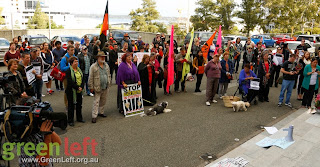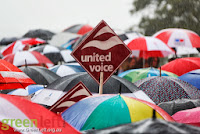Sam Wainwright and
Margarita Windisch stood for the
Socialist Alliance in the federal election in the seat of Fremantle in Western Australia and Wills in Victoria, respectively.
Green Left Weekly spoke to them about their campaigns.
***
What were some of the highlights of your election campaign?
Margarita: People in the seat of Wills had eight candidates to choose from and we increased our modest vote in a quite polarised election, so that’s positive. We participated in four well-attended election forums and four rallies, putting forward socialist solutions to a range of issues.
In Wills, the Socialist Alliance were the only ones raising the idea of public ownership as a necessary precondition to addressing climate change, to reducing the crippling cost of living and developing real democracy in the economy.
We used polling day to build the September 21 refugee protest for which we got an excellent response. We had some Greens polling booth staffers who said they would vote for us because of our clear position on nationalising mines, energy and the banks.
Sam: I think we had a greater impact than ever before. At just under 1%, our first preference vote is still tiny in absolute terms, but since we first ran in 2004 where we got 350 votes, our vote has increased at every election, to 731 this time.
I think our presence and impact has also grown over this time. In 2007, the Greens preferenced us after Labor, but in 2010 and 2013 they put us ahead of Labor. That reflects a growing respect for our work and ideas among a layer of Greens voters.
Anecdotally, we got a lot of reports of Labor voters breaking the Labor how-to-vote and preferencing us second. I think we can say that the profile and respect we've won is greater than and advances in front of our first preference vote.
A highlight of the campaign had to be our trailer, which crisscrossed the electorate covered in signs, topped with flags, and pumping out AC/DC's “Thunderstruck” at full blast.
Why is it important for socialist candidates to run in elections?
Margarita: If we are serious about getting rid of capitalism then we have to demonstrate that through a range of means, one of which is participation in the electoral process, without adopting an electoralist or reformist outlook.
Sam: Socialists have lots of big ideas about how we can and have to change the world. Standing in elections compels us to try to test our ideas and explain them to a broader audience in a language people understand. It also creates a dialogue between us and the many good activists we work with who would ordinarily just vote Green or Labor.
Elections focus political discussion and give us an opportunity to explain why it's simply not possible to substantially redistribute wealth or stop run away global warming without extending democratic public ownership to strategic sectors of the economy. We pull our discussion with a section of the electorate to the left.
It is also a way to connect with a broader layer of people beyond the inner city suburbs. There is a lot of alienation in suburbia, partly fostered by a sensationalist and superficial media.
People’s feelings of neglect and abandonment by the two-party political system is further compounded by the lack of infrastructure and job opportunities. Elections give us the opportunity to distribute material that advocates working-class and environmentally friendly solutions to the neoliberal crisis.
This election we sought to very explicitly raise the need for more public ownership. While so-called expert commentators looked at us like we were mad for raising this, what was notable was what a good reception it got from everyday people, including rank and file members of the Labor Party and Greens.
It's actually a pretty easy case for people to understand. It's self-evident that the revenues of the fossil fuel industry itself should pay for the renewable energy infrastructure of the future, that it should pay for its own obsolescence.
This can only happen with democratic public ownership. People remember that the Commonwealth Bank used to be publicly owned, that Labor PM Ben Chifley had tried to nationalise the entire banking sector. They like the idea of a local community-owned wind or solar farm. Why not extend this logic to other sectors of the economy? In a modest way, we've started an important discussion.
In your opinion, why did Tony Abbott and the Coalition beat Labor? Has the electorate swung to the right?
Margarita: The centre of politics has shifted to the right over a period of years now. This is best demonstrated by the increasingly neoliberal and racist policies of the social democratic ALP.
This phenomena of a rightward shift of social democratic parties is not unique to Australia, it is also a trend experienced in Europe. At the same time, the Greens have stabilised themselves as a legitimate third force, to the left of the ALP.
More people gave their primary vote to the ALP over the Coalition, but it was the lowest vote for Labor since World War II.
Interestingly, the swing away from the ALP wasn't really absorbed by the Coalition or the Greens, but by other conservative minor parties, such as the Palmer United Party. Palmer spent millions of dollars on his campaign and promised a boost to pensions. Some people also voted for him because he was “funny”, an apolitical protest vote.
The Greens are possibly tainted by their close alignment with the Gillard government and their participation in the Tasmanian government, implementing service cuts.
Sam: No, I don't think this is a valid conclusion.
Certainly some voters shifted from Labor to the Coalition. The Labor leadership circus genuinely alienated people, and their complete capitulation to the refugee-bashing agenda only served to legitimise the Coalition.
In Fremantle, Labor's primary vote increased while the Liberals’ dropped slightly. I think there were many countervailing currents; people who deserted Labor and went to the Greens over the refugee issue, people who gravitated back to Labor from the Greens over fear of an Abbott victory; and those who drifted away from the Coalition, Labor and the Greens to vote for Palmer's populism.
Meanwhile the Greens probably also lost some so-called "blue Greens" over their stand on refugees.
All these things were going on in different proportions in different electorates. This, combined with the high level of abstention and informal voting shows that the long-term decline of the stable two-party system in Australian politics is continuing.
[This interview with Sam Wainwright and Margarita Windisch was conducted by Mel Barnes for Green Left Weekly #982.]
Sam Wainwright: 'You can't fight coke with diet coke' at GetUp candidates forum








 It has also been reported that schools are planning to reduce the number of subject options for year 11 and 12. In response, the education department hierarchy has stepped in to direct schools to allow current year 11 students to complete their courses.
It has also been reported that schools are planning to reduce the number of subject options for year 11 and 12. In response, the education department hierarchy has stepped in to direct schools to allow current year 11 students to complete their courses. The $4000 charge on only a section of the community is a blatant attempt at “divide and rule”. It is important that the union movement as a whole defends the rights of these workers by opposing this fee as an integral part of the campaign to defend education.
The $4000 charge on only a section of the community is a blatant attempt at “divide and rule”. It is important that the union movement as a whole defends the rights of these workers by opposing this fee as an integral part of the campaign to defend education. It has also been reported that schools are planning to reduce the number of subject options for year 11 and 12. In response, the education department hierarchy has stepped in to direct schools to allow current year 11 students to complete their courses.
It has also been reported that schools are planning to reduce the number of subject options for year 11 and 12. In response, the education department hierarchy has stepped in to direct schools to allow current year 11 students to complete their courses. The $4000 charge on only a section of the community is a blatant attempt at “divide and rule”. It is important that the union movement as a whole defends the rights of these workers by opposing this fee as an integral part of the campaign to defend education.
The $4000 charge on only a section of the community is a blatant attempt at “divide and rule”. It is important that the union movement as a whole defends the rights of these workers by opposing this fee as an integral part of the campaign to defend education. This video clip shows Sam Wainwright explaining the importance of a number 1 vote for the Socialist Alliance.
This video clip shows Sam Wainwright explaining the importance of a number 1 vote for the Socialist Alliance.